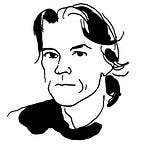Could a narcissist hold one key to life most of us never find?
What ”Inventing Anna” (possibly) can teach us
I suspect the following musing could easily be misunderstood if read carelessly, so please try to catch my core message.
A few weeks ago, I watched the drama miniseries ”Inventing Anna” on one of the big movie streaming platforms. If you haven’t seen it, here’s Wikipedia’s summary:
Under the assumed name Anna Delvey, Russian-born Anna Sorokin is able to con members of New York City’s upper crust into believing she is a German heiress with access to a substantial fortune. She leverages this image into receiving hundreds of thousands of dollars in cash, goods and services while working toward her goal of opening an exclusive art-themed club.
Anna ends up in court and is sentenced to prison. The series is based on a true story.
At first, I didn’t think much of what I had seen, other than it being an interesting story about deception, illusion, hope and greed — ingredients in the rich kaleidoscope of humanity. Not exactly the spiritual vibe.
But after a while it struck me that what Anna was pursuing was in one respect probably very much what we all should be better at pursuing.
I say ”in one respect”, because before I go any further I must clarify one thing. Anna showed every sign of suffering from a narcissistic personality disorder, and the way she chose to behave in the world and treat other people was dismal. It amounts to a cautionary tale, nothing anyone should copy.
What I mean is this: The audacious and seemingly natural way in which she was able to mentally visualize a glorious future is more or less precisely how ancient sages as well as modern spiritual teachers say we actually create our lives, and ultimately the world. Anna put that into practice — in her twisted way.
Anna didn’t wish she had the money, the properties and the fame that she envisaged, she never doubted for a second those things were there for her to grab. She didn’t believe it was to come true one day, no, she knew that it was true, that it was the only possible reality. There was only a slight delay in the manifestation of it. But that is simply how things work on Earth, right?
”Visualize it and feel, truly feel, as if you already have it. If you wish, all the universe hears is that you don’t have it.” Isn’t this what we learn from mystic traditions, ancient texts, Gaia TV and various gurus on Youtube?
This is the method, the practice. It goes without saying that what it is you visualize makes all the difference — for you, and for the world around you.
Anna’s followers were co-creating her dream by believing in it. Many of them lended her money or paid for her without her expressly asking for it. Some loved her, or at least admired her, and continued doing so even when she was dragged before the bar.
The reason Anna didn’t succeed in the end was obviously that she was emotionally and spiritually gravely curtailed. She clearly didn’t love herself. Behind a mask of extreme confidence her self-esteem was brittle as an egg shell (which she most likely wasn’t aware of herself).
She never doubted for a second those things were there for her to grab
The more I ponder how life unfolds, the more convinced I become that it works the way I have described it above, in principle. If your experience is that you end up having problems all the time and often think ”I always end up having problems”, well, guess what you are going to experience: more problems. If you focus very little on problems, you really do experience very few of them (and when you do, you tend not to react so much as to respond and solve). In accordance with this, if you conjure up a reality where your dreams have come true, chances are immensely much greater that they will than if you never imagine that such a reality is possible.
But I also believe there is a catch: love. For the best results, the wish-come-true operation probably needs to be a win-win for all humans involved. This doesn’t mean that everybody gets the same, but that everybody feels they gain in some way, because love, not fear, is the driving force. The universe is not a zero-sum game, which many sadly believe.
There are also two other important parts of the manifesting process, as I understand it. Anna was not able to master any of them.
The first is that once you have sent out your emotionally elevated vision to the universe, you must let go. And wait. This is probably the trickiest part.
The second is that you also must not be too specific. The part of you that is in contact with the universe knows way better than your ego self exactly how your desires best manifest. Therefore, you should not have any expectations of the outcome. Also tricky, to put it mildly.
Anna never let go. And specificity was her middle name. So: failure.
The wish-come-true operation probably needs to be a win-win for all humans involved
But it was very interesting to study how she saw things from her narcissist perspective throughout the whole process, even when she was in prison and during the trial. From her point of view she never did anything wrong. She came so close to her goals. She was probably convinced she helped the people she chose to engage with to lift themselves above their mundane lives.
Could it be that people with grandiose personality disorder, who seem to miss so many keys needed for living a fulfilling, loving and happy life, have found one key, one that most of us never find: to be certain that one’s dream is real?
